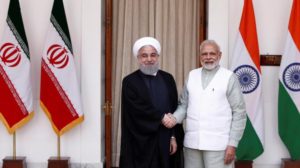
Dr. Manoj Kumar Mishra 23 September 2018
As American sanction threats on Iran mounted with fresh sanctions waiting, its impacts on India are clearly visible. As per news reports, Iran is left with only 2 oil clients in India after Chennai Petroleum has announced to stop processing Iranian crude oil. Many Indian insurance companies are expressing their inability to cover any liability pertaining to processing of Iranian crude oil because of their links with western reinsurance market. It is noteworthy that Iran replaced Saudi Arabia as the second largest oil supplier to Indian state refiners between April and June 2018. However, India’s oil imports from Iran reduced by 16 per cent from May in a direction to meet the US stipulation of zero imports with new phase of sanctions commencing from November 4, 2018. India is one of the largest global consumers of oil and its imports account for more than 80 per cent. While the past few years have witnessed a further surge in oil consumption, the American sanctions are likely to adversely impact the Indian economy. This apart, US sanctions on Iran have prevented India to make any progress to develop strategically vital Chabahar port which would have provided New Delhi much desired access to Afghanistan and Central Asia. On the other side, amidst the controversial US state department and treasury department’s coordinated efforts to impose sanctions on the Beijing’s military equipment development department and its director, the US has indicated that India could come under sanctions if it pursues its decision to buy S-400 surface-to-air missile system. It is worthwhile to note that India’s close defence ties with Russia is not only imperative for repairing and updating its existing Russian-made defence equipment but its desire for pursuing a policy of multi-alignment required fresh defence deals to diversify its military supplies notwithstanding the fact that any major defence deals with Russia are likely to face sanctions under the American law.
It seems India is losing its maneuverability by forging close strategic ties with the US. India historically allowed the US that much strategic space which had enabled New Delhi to voice its concerns at global platforms and allowed it to forge relations with other countries and take decisions on the merit of issues. While leadership in New Delhi has theoretically affirmed that India would only respect the sanctions imposed by the UN Security Council, Indian responses to the sanctions imposed by the US strike a discordant note with its assertion and indicate its rising economic and military dependence on the US. Being a developing country, India’s economic needs, its stance on climate issues and sovereignty-human rights debate placed it on a different platform from that of the US. While the Trump Administration preferred to walk away from Paris Climate Conference, India under Modi’s leadership sought to play key role along with other developing countries to make it a success. India has, for long, sought reforms at the global financial institutions such as World Bank and IMF which largely represented developed countries’ sway, in order to make them more democratic. While on the one hand, India has been voicing its trade related concerns at the WTO, it has been advocating reforms of the UN Security Council to make it more representative and democratic.
India’s strategic autonomy allowed it to object to militaristic roles pursued by the US or NATO in instances such as Kosovo and Iraq where inefficacy of peaceful measures against authoritarian regimes were used as excuses to bypass the authorization of the UN Security Council. New Delhi firmly argued that any form of government be it authoritarian, democratic or communist is an internal affair and the consent of the functioning state was required before sending peace-keeping operations. When the US and its allies threw their weight behind UN Security Council resolutions in instances like Libya and Syria, that implicitly promoted the US or NATO’s active role in strengthening anti-regime forces, helped push their agenda of democracy and assigned militaristic roles without exhausting all the peaceful options, India argued that it is the state with which lies the prime responsibility of human rights protection (first pillar of R2P) and supported the second pillar of R2P which states that it is only when the state fails or is unwilling to protect its population; the international community needs to come to its assistance. New Delhi consistently pleaded at the UN that it is only after all the peaceful measures are exhausted, military measures can be used as the last resort but strictly with the authorization of the UN Security Council. While India did not recognize independence of Kosovo, the US-led war efforts against Iraq were criticized in both houses of the Indian Parliament and India decided not to send troops to Iraq in support of American war efforts. India abstained from some specific UN Security Council resolutions that assigned the US forces or NATO with far-reaching mandate threatening sovereignty of target states including Libya and Syria, it made categorical statements in the UN and other forums as to its concerns related to violation of sovereignty starting from Kosovo to Syria.
India, a country with growing economic needs and resource consumption, limited power projection abilities and other development-related concerns must zealously endeavor to safeguard its prized strategic autonomy which seems to be tottering under American sanctions.
